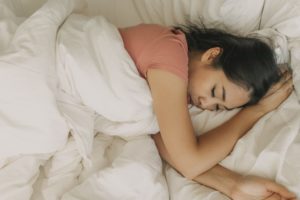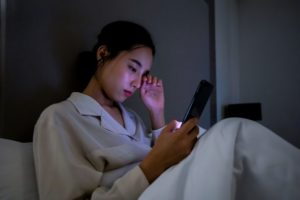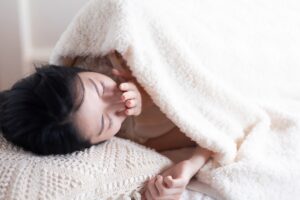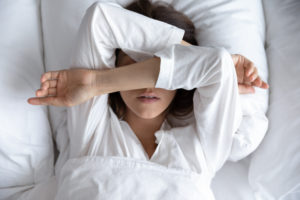When you buy through our links, we may earn a commission. Products or services may be offered by an affiliated entity. Learn more.
Is 5 Hours of Sleep Enough?
- Experts recommend adults get at least 7 hours of sleep per night for better health.
- Consistently getting less than 5 hours of sleep can have adverse effects on physical and mental health.
- Inadequate sleep can impact memory, mood, concentration, immunity, and overall quality of life.
- Improving sleep hygiene, optimizing your sleep environment, and creating a consistent sleep schedule can help you sleep longer.
Modern life can be demanding, so it may be tempting to cut sleep short because of work obligations, social activities, or simply to have more free time. While most adults need at least seven hours of sleep, some adults average five or fewer hours of sleep each night.
While it may seem like enough sleep, regularly getting only five hours of sleep each night may lead to sleep deprivation. We discuss the risks associated with short sleep and the steps you can take to get more rest.
Looking to improve your sleep? Try upgrading your mattress.
Recommended Hours of Sleep by Age
Most adults need seven or more hours of sleep each night. In general, how much sleep a person needs depends largely on their age .
| Age Group | Age Range | Recommended Hours of Sleep |
|---|---|---|
| Infant | 4-12 months old | 12-16 hours (including naps) |
| Toddler | 1-2 years old | 11-14 hours (including naps) |
| Preschool | 3-5 years old | 10-13 hours (including naps) |
| School-age | 6-12 years old | 9-12 hours |
| Teen | 13-18 years old | 8-10 hours |
| Adult | 18 years old and older | 7 or more hours |
Some people may find that their individual sleep needs fall outside the recommended range. One way to gauge how much sleep a person needs is to have them sleep until they naturally wake up without an alarm. It also helps for a person to pay attention to their energy levels throughout the day to determine whether they are getting enough sleep.
There is a small percentage of the population known as short sleepers. These are people who naturally sleep for fewer hours than what is expected for their age group and still feel rested. Being a naturally short sleeper is not the same as forgoing sleep because of work, social, or other activities.
It is worth noting that being a natural short sleeper is uncommon and thought to be related to a person’s genetics. Additionally, researchers do not yet know if naturally short sleepers are at the same risk of negative health consequences as people who are sleep deprived.
Sleep Basics: Quality vs. Quantity
Sleeping well requires both spending enough time asleep and getting high-quality rest. While it is somewhat straightforward to determine whether a person is spending the recommended number of hours in bed, it can be more challenging to measure their sleep quality.
Sleep quality is partially subjective and depends on how rested a person feels when they wake up and throughout the rest of the day. Sleep quality can also be measured in several ways.
- Sleep latency:Sleep latency is a measurement of how long it takes someone to fall asleep. Falling asleep in around 15 to 20 minutes is a typical sign of a healthy sleep latency.
- Sleep efficiency: Sleep efficiency describes how much time in bed is actually spent sleeping. Experts consider a healthy sleep efficiency to be around 85%.
- Nighttime awakenings: Also called the number of arousals, this is a measurement of how often a person wakes up during the night. Too much time spent awake at night can be a sign of sleep fragmentation and poor-quality rest.
- Sleep stages: Sleep quality also depends on how much time a person spends in the different stages of sleep. For example, spending too much time in lighter sleep stages can cause a person to lose deep sleep that is important for feeling alert the next morning.
Is It Normal to Have Daytime Sleepiness?
Many people experience some sleepiness during the day, especially in the mid-afternoon. The reason behind this has to do with the two processes that regulate an individual’s sleep – circadian rhythms and the sleep drive.
Circadian rhythms are daily cycles in the body, including those that influence a person’s sleep and wake patterns. In the afternoon, there is a natural drop in the circadian rhythms that drive wakefulness. At the same time, a person’s sleep drive is increasing. Sleep drive is the body’s way of signaling its accumulating need for sleep, which builds during every hour of wakefulness.
While passing feelings of tiredness may be normal, too much sleepiness during the day can be a symptom of sleep deprivation or an underlying health condition. Signs of excessive sleepiness include:
- Feeling tired throughout most of the day
- Struggling with daily activities
- Dozing off unexpectedly
The Impact of Getting Only 5 Hours of Sleep
Only getting five hours of sleep affects a person’s daytime functioning, sense of well-being, and both their mental and physical health. Though one night of insufficient sleep has consequences, the effects of sleep deprivation are cumulative . So a person who gets five hours of sleep night after night will likely feel worse each day.
It is worth noting that some people may feel like they can get by on five hours of sleep. Research shows that this is because individuals who are regularly sleep deprived may get used to the symptoms , not because they no longer experience the effects of sleep loss.
Cognitive Functioning
The most noticeable effects of sleep deprivation relate to a person’s mental functioning. Lack of sleep makes it harder to concentrate, take longer to react, and increases difficulties reasoning through complex tasks. These effects of sleep loss can lead to challenges at work, school, and in daily life.
Sleep is also important for learning and memory because researchers believe that it is during sleep that new information is integrated into memory. Staying up late to study for a test or prepare for a presentation can actually backfire because, without enough sleep, it is also harder to focus and do well in school.
Mood and Mental Health
Lack of sleep can make people more irritable and less able to manage their emotions and deal with stress. People who are sleep deprived might also feel anxious or depressed, and research has found a link between long-term sleep loss and the development of mental health conditions like depression and anxiety.
Greater Risk of Accidents
Because sleep loss negatively impacts concentration and reaction time, it can also increase errors and accidents. Errors can be seemingly benign like making an administrative error or as serious as a doctor misdiagnosing a patient.
Perhaps one of the most dire consequences of sleep deprivation is drowsy driving. People who are tired at the wheel might nod off for a few seconds, and experience what experts call a microsleep. In fact, sleep deprivation is a major contributor to car accidents.
Physical Health Impacts
Sleep is extremely important for physical health, which is why persistent sleep deprivation can have long-term health impacts. Loss of sleep is a risk factor for cardiovascular health issues like high blood pressure, stroke, and heart disease. It’s also been linked to type 2 diabetes and kidney disease.
In the short term, sleep loss may negatively affect the immune system and the body’s ability to fight disease.
Quality of Life
One of the most impactful consequences of sleep loss is on a person’s quality of life. Lack of sleep can impact overall quality of life as people are less likely to engage in activities they enjoy because their energy is low. Feeling excessively tired or falling asleep unexpectedly at home or work can affect a person’s career, create tension among peers, and even impact relationships.
Why We Are Not Getting Enough Sleep
Sleep is cut short for a variety of reasons, including work, travel, social activities, and leisure time.
- Bedtime procrastination: Social activities in the evening can bleed into the time people would normally be sleeping. Additionally, when people feel like they do not get enough free time during the day, they might stay up late in order to have more leisure time.
- Work demands: Whether a person works inside or outside of the home, busy schedules may not always allow for enough sleep. People are also more reachable than ever and might feel the pressure to stay up late responding to emails or working on projects.
- Shift work:Shift work is any work schedule that falls outside of the hours of 7 a.m. and 6 p.m. Shift workers often have to work when they would normally be sleeping and then must try to sleep during the day.
- Health issues and substances: Many mental and physical health conditions can make it difficult to fall and stay asleep, including diseases of the heart or lungs, high blood pressure, diabetes, chronic pain, anxiety, and depression. A variety of medications and substances like caffeine, alcohol, and nicotine can also interfere with sleep.
- Sleep disorders:Sleep disorders like insomnia, sleep apnea, restless leg syndrome, and others can make it difficult to get enough sleep, often impacting a person’s ability to fall asleep or leading to frequent awakenings.
- Sleep environment: A person’s sleep environment can also impact their sleep. A bedroom should ideally be free of lights, sounds, and on the cooler side. It is also recommended to keep electronics out of the bedroom.
How to Get Enough Sleep
Recovering after several days of sleeping for only five hours can take time. While it is possible to recover from a sleep debt, studies show that it takes about four days to recover from just one hour of missed sleep, and recovery time grows as sleep debt accumulates.
To prevent future sleep loss, people should consider taking steps to improve their nightly rest. While some factors that impact sleep are difficult to change, like work schedules or a new baby, there are steps that anyone can take to maximize the time they spend in bed and improve their sleep quality.
- Set a bedtime schedule and routine: Sticking to a consistent sleep schedule, even on weekends can help ensure a person gets the hours of sleep they need and limits the detrimental effects that an erratic sleep schedule can have on a person’s circadian rhythms. Winding down before bed with something relaxing, like a book or a cup of tea, can help prepare the mind and body for sleep.
- Avoid electronics: Electronics like phones, computers, and TVs emit blue light, which mimics daylight and can interfere with the ability to fall asleep. People often use electronics when bedtime procrastinating, too, so putting them away can help avoid that pattern.
- Explore shift work solutions: There are a variety of strategies for shift workers to help them get more rest. It is important for shift workers to maintain a consistent sleep schedule and employ tools like sleep masks, blackout shades, and white noise machines when trying to sleep during the day.
- Avoid certain substances: Avoid caffeine, nicotine, or alcohol too close to bed, as these substances can interfere with quality sleep. People taking medications that may be interfering with their sleep should talk to their doctor.

Still have questions? Ask our community!
Join our Sleep Care Community — a trusted hub of sleep health professionals, product specialists, and people just like you. Whether you need expert sleep advice for your insomnia or you’re searching for the perfect mattress, we’ve got you covered. Get personalized guidance from the experts who know sleep best.
References
5 Sources
-
Paruthi, S., Brooks, L. J., D’Ambrosio, C., Hall, W. A., Kotagal, S., Lloyd, R. M., Malow, B. A., Maski, K., Nichols, C., Quan, S. F., Rosen, C. L., Troester, M. M., & Wise, M. S. (2016). Consensus statement of the American Academy of Sleep Medicine on the recommended amount of sleep for healthy children: Methodology and discussion. Journal of Clinical Sleep Medicine, 12(11), 1549–1561.
https://pubmed.ncbi.nlm.nih.gov/27707447/ -
National Institutes of Health. (2019, September 17). Gene identified in people who need little sleep., Retrieved January 16, 2023, from
https://www.nih.gov/news-events/nih-research-matters/gene-identified-people-who-need-little-sleep -
Schwab, R. J. (2022, May). Overview of sleep. Merck Manual Consumer Version., Retrieved January 16, 2023, from
https://www.merckmanuals.com/home/brain,-spinal-cord,-and-nerve-disorders/sleep-disorders/overview-of-sleep -
Lee, S. (2022). Naturally occurring consecutive sleep loss and day-to-day trajectories of affective and physical well-being. Annals of Behavioral Medicine, 56(4), 393–404.
https://pubmed.ncbi.nlm.nih.gov/34223608/ -
Van Dongen, H. P., Maislin, G., Mullington, J. M., & Dinges, D. F. (2003). The cumulative cost of additional wakefulness: Dose-response effects on neurobehavioral functions and sleep physiology from chronic sleep restriction and total sleep deprivation. Sleep, 26(2), 117–126.
https://pubmed.ncbi.nlm.nih.gov/12683469/











